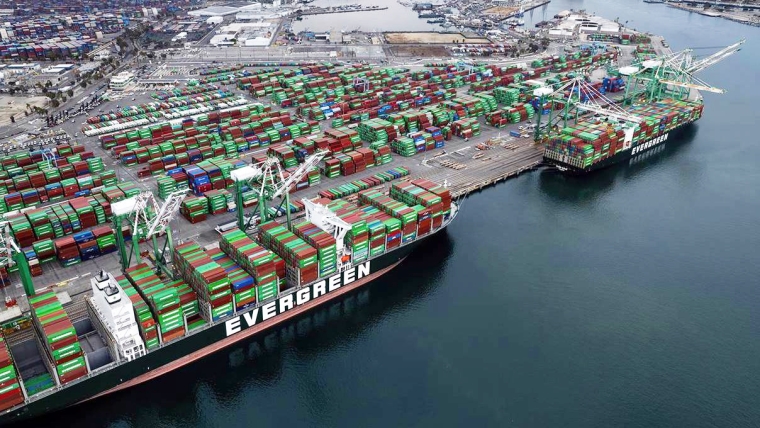
One of the main goals that US President Joe Biden has set for his administration is to empower American workers and the country’s middle class. Many believe that globalisation (along with several other factors) contributed to stagnating real wages, rising inequality, and the sense that American workers have lost out to workers in other countries with lower labour standards. But in its attempt to reverse these trends, the Biden administration has embraced protectionist rhetoric and policies that will cause American workers to lose once again.
Though any mention of the word “openness” is met with suspicion nowadays, the surge in inflation – the US Consumer Price Index was up 8.3% in April – has nonetheless prompted a discussion among economists about whether trade liberalisation (and openness more generally) could be used to rein in rising prices. Since one of the main arguments for free trade is that it lowers prices for consumers, the link between open borders and inflation is worth contemplating.
To be clear, no reasonable economist claims that the recent inflation is the result of trade restrictions. By now, the causes are well understood to be a combination of pandemic-driven supply-side shortages, policy-fueled demand, and further supply-side disruptions caused by Russia’s war in Ukraine. But as policymakers struggle to contain inflation without causing a recession, they must recognise that “Buy American” requirements, tariffs, and immigration restrictions may be making a bad situation worse.
According to a recent Peterson Institute for International Economics (PIIE) policy brief, a feasible reduction of trade barriers “could deliver a one-time reduction in [CPI] inflation of around 1.3 percentage points.” The study is conservative, focusing only on trade restrictions that can plausibly be lifted in the short term, and its authors are careful to emphasise that the result would be a one-time outcome. The proposed reduction of trade barriers would not solve the problem of rising prices; but it would make today’s high prices lower.
US consumers would welcome such short-term relief. If the Biden administration finds it necessary to sell oil out of the Strategic Petroleum Reserve despite its commitment to addressing climate change, why shouldn’t it also recognise the need to reverse Donald Trump’s tariffs? In 2021, according to the PIIE brief, these duties still applied to more than half of US imports “subject to high tariffs, penalty duties, or severe quotas.”
Perhaps more importantly, openness, whether it is free trade or immigration, also contributes to consumer welfare in indirect ways. Though these effects are often hard to quantify, they are of first-order importance, which is why economists often turn to first principles when debating them.
One of the most important benefits of free trade is that it exposes domestic firms (and labour markets) to greater competition, which induces them to keep prices low and to innovate constantly to stay ahead of the curve. Similarly, immigration eases labour-supply shortages, and high-skilled newcomers can boost productivity and innovation. Forward-looking countries understand this and embrace immigration. The United Kingdom, for example, has adopted a new skilled-worker visa program that welcomes graduates of top global universities.
It is deeply misguided to restrict trade and immigration at a time when rising domestic prices are of paramount concern. Now that everyone is fixated on inflation, it is worth considering why inflation was so low these past two decades, despite full employment in the United States (prior to the pandemic) and despite ultra-expansionary monetary policies. Globalisation (now a loaded term) arguably had a lot to do with it, as did automation (another loaded term).
The prospect of outsourcing jobs to lower-wage countries or to machines constrained workers’ bargaining power. At the same time, foreign competition constrained domestic firms’ pricing power (though there is ample evidence that the cost reductions they achieved by globalising production still allowed them to make hefty profits).
Workers and firms face a different reality today. Their jobs and businesses seem more secure now that the US has turned inward and embraced protectionism. The “Great Resignation” and other developments have reduced the supply of workers, increasing the bargaining power of those still in the labour force.
This could be a positive development, except that the high inflation rate has undermined efforts to make the average American worker better off. While nominal wages in the US rose by 5.6% in the year ending in March (more than an extrapolation of the earlier trend would have implied), that month’s 8.5% inflation rate implied that real wages fell by 2.7%.
If there is any silver lining to today’s inflation, it lies in the lessons that this episode has provided to policymakers and the public alike. Because the benefits of open borders (lower prices) are less salient than the costs (lost jobs or lower wages), and because consumer interests are not organised, while worker interests often are, there is a bias toward protectionist sentiment. Today’s inflation highlights the need to resist this bias.
The current decline in real wages is a reminder that our well-being depends not only on the nominal wages we earn as workers but also on the prices we pay as consumers. Open borders can help keep prices low during a challenging time. Reversing the tariffs imposed by the Trump administration would be a step in the right direction.
Pinelopi Koujianou Goldberg, a former World Bank Group chief economist and editor-in-chief of the American Economic Review, is Professor of Economics at Yale University. Copyright: Project Syndicate, 2022, published here with permission.
6 Comments
The current decline in real wages is a reminder that our well-being depends not only on the nominal wages we earn as workers but also on the prices we pay as consumers.
I'm yet to be 100% convinced this works for the average person. As capital isn't distributed evenly, an individual's "worth" in the market is related to the value of their labour. That seems like it will only deteriorate when you increase the amount of competition for an individual 100 fold by opening up to billions of additional workers.
This dishonest globalist goblin is selling a mess of pottage. We cry Esau's tears for selling our birth right to these lying scum to be bankrupt in the land of our fathers to the international capitalist.
"One of the most important benefits of free trade is that it exposes domestic firms (and labour markets) to greater competition, which induces them to keep prices low and to innovate constantly to stay ahead of the curve"- this isn't true because what happens over time is the competition breaks down to a few players who can compete. Imagine anyone in New Zealand trying to compete on manufacturing anything outside food products and niche light manufacturing goods after the globalist ideology took off here. What you really get is price gouging and profit seeking from the oligopolistic practices of the firms who survive. Why do only four companies in the US control 85% of the meat processing market? Because the 'free market' enabled predatory pricing practice and consolidations which force cattle prices lower and force meat prices up. Why does Uber, which used to provide great service in 2014 when it was breaking the back of the taxi market, suck worse than taxis now?
"Similarly, immigration eases labour-supply shortages, and high-skilled newcomers can boost productivity and innovation" - This really worked out in New Zealand right? We didn't get 90% cheap labour to undermine workers for the capitalist elite right?
The reason to restrict some trade is to maintain your own ability to produce goods and to keep local economic systems strong. Fundamentally raising worker wages and conditions matters more than consuming cheap goods. The whole issue with the extremely complex and socially interconnected supply chain we have today is it has very little redundancy and is vulnerable to external system shocks, whether it is covid or other crises. We now have very little if no control over our ability to manufacture the goods we need in the face of global inflation because we got all that deflationary price pressure from outsourcing our industry. We are completely vulnerable and must accept whatever fate we receive.
Just compare our society in the 1970s and 80s with the dystopian hell we live in now for social conditions. Noting repudiates the homo economicus worldview more than viewing its consequences. Fredrich List's The National System of Political Economy explores the same dynamic of deindustrialisation occurring over and over again in favour of international finance throughout the centuries and the only conclusion is these weasels should be ignored.
The globalists have had their time, for now. But they'll be back.
However, right now, I believe & I hope that we are able to re-introduce some of those lost skills back into NZ in manufacturing, science & food, medicine & wellbeing, bio-ag (which is potentially huge for us) innovative building techniques involving more timber (hopefully) re-inventing wool somehow (footwear surely) developing more sustainable energy sources, growing our IT industries into world-beating technologies, farming our seas in a sustainable way & much more besides.
When we finally get a govt who wants to develop local businesses I hope we can look at our economic boundaries out to the limit, which means looking at what we've got in the ground under our waters. We've got our own phosphorus type deposits off the west coast of the NI but the locals don't want a bar of it, until that is they're cut in.
Our oil & gas reserves are mostly offshore which would make us energy independent, which has to beat shipping dirty coal from Indonesia, surely. And don't forget the lignite under the Southland soils, in current energy use terms, about 300 years worth, but we need to develop a way we can use it & recycle the gases so that it meets our climate aspirations.
It's all here. These are natural resources. Gifts from God. Providing we can do it without polluting our environments, it's all possible.
Gifts from God? Spare me. They are finite mineral deposits.
And the debate went past the lignite option, for EROEI reasons, a decade ago.
That was when Brownlee junior was looking for a job, from memory....
Trouble is, it's ending up as global corporatization, and imho that is no good.
We are now so reliant on foreign corporations we can't even park our cars without one (Wilsons) and some of our most iconic kiwi brands Edmonds, Vogels, Meadowfresh, and many others owned by the world's largest palm oil processor (Wilmar, via their ownership of Goodman Fielder). They also own Chelsea Sugar, so go try bake a cake without their involvement.
It's fine trading, it's not fine being just about entirely foreign owned, is that really what it's all about?
Inflation and tariffs weren't even concurrent events.
I agree that foisting cheap goods made by low wage workers somewhere without health and safety, environmental standards or human rights into an OECD market would likely marginally decrease local prices by driving down local wages. Why would I want that though?
The free trade and trade liberalisation experiment is over, it failed. Time to move on.

We welcome your comments below. If you are not already registered, please register to comment
Remember we welcome robust, respectful and insightful debate. We don't welcome abusive or defamatory comments and will de-register those repeatedly making such comments. Our current comment policy is here.